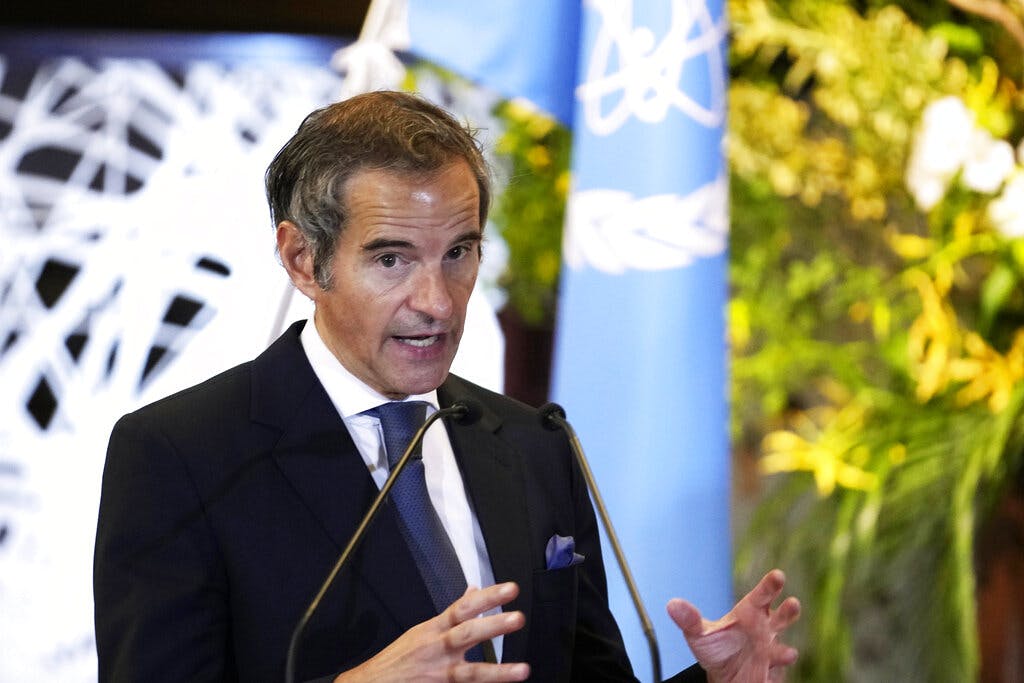Israel Hones Its Unofficial Iran Anti-Nuclear Program as the IAEA Struggles
One reason for concern about Iran’s nuclear program is that the Islamic Republic has often declared its intent to wipe Israel off the map and has portrayed Jews as a disease.

As relations deteriorate between Iran and the agency charged with limiting global nuclear arms distribution, Israel is honing its own brand of nonproliferation assurance.
Iran today announced it would cut off cameras the International Atomic Energy Agency installed in one of its nuclear facilities. The move is widely seen as a retaliation against an IAEA assessment regarding Tehran’s refusal to cooperate with the Vienna-based nuclear watchdog.
The IAEA has reported that Iran did not supply a scientifically credible explanation for the presence of man-made uranium in three of its undeclared nuclear sites. An American-sponsored resolution that expresses “concerns” and calls on Iran “to act on an urgent basis to fulfill its legal obligations” was passed today by a large majority at the IAEA’s 35-member board of governors.
The Tehran atomic agency’s spokesman, Behrouz Kamalvandi, said the act of shutting down the cameras was a “wake-up call” to the IAEA. He said other such moves may follow. Beyond the latest rebuke by the agency, Iran is irate that the nuclear agency’s director, Rafael Grossi, visited Israel on Friday.
Two days later, in his opening speech to the board at Vienna, Mr. Grossi said he could not confirm Iran’s adherence to its “safeguards agreement” as a signatory to the Nuclear Non-Proliferation treaty. “Unless and until” Tehran gives a credible explanation, it would remain in violation, Mr. Grossi said.
Tehran denounced Mr. Grossi’s Israel visit and demanded he investigate the Jewish state’s nuclear facilities instead. Unlike Iran, however, Israel is not a party to the NPT. While it has declined to publicly acknowledge it, Israel is widely reported to possess a large nuclear arsenal.
One reason for concern about Iran’s nuclear program is that the Islamic Republic has often declared its intent to wipe Israel off the map and has portrayed Jews as a disease. “The Zionists have always been a plague, even before establishing the fraudulent Zionist regime. Even then, Zionist capitalists were a plague for the whole world. Now they’re a plague especially for the world of Islam,” the regime’s supreme leader, Ali Khamenei, tweeted today.
Israeli leaders have long said they would not await international action as the Islamic Republic prepares the kind of weapon that can fulfill its genocidal dreams. As part of a political game of one-upmanship, Jerusalem leaders increasingly compete in advertising the country’s abilities to intervene militarily in Iran.
As the Jerusalem Post reports today, the Israeli Defense Force has upgraded the capacity of its F-35 fighter jets to allow them to fly to Iran from Israel without refueling. Additionally, the IDF is integrating into its F-35 arsenal a locally developed one-ton bomb that can be carried inside the fighter jet without harming its stealth capabilities.
“In recent years Iran has crossed a series of red lines, most notably in April last year … when it crossed the uranium enrichment line at 60 percent without any counter-reaction,” Prime Minister Bennett told the Knesset’s foreign affairs and defense committee today.
Regardless of their opinion of the utility of the 2015 nuclear deal, the JCPOA, Israeli defense officials are increasingly convinced now that its renewal is unlikely — even as President Biden continues to say it is still America’s goal.
As yet, the Biden administration has declined to delineate an alternative to diplomacy or offer any other way to stop Iran’s nuclear advance. That is despite the IAEA recently assessing that Iran has enough enriched uranium to make at least one bomb.
The JCPOA, according to its Obama-era promoters, was an agreement that relied not only on Iranian politicians’ word that they do not seek a nuclear weapon, but included extensive, intrusive inspection.
Through the years, the IAEA, the agency charged with guaranteeing the agreement’s implementation, was often stymied by the Iranians. Yet, IAEA reports often overlooked various violations. Instead, they highlighted even tentative inspection agreements with Tehran as proof that Iran was cooperating with the pact.
Mr. Grossi’s latest report and today’s rebuke by the IAEA board are a departure from old habits.
Cutting off cameras in retaliation is “a strike against the monitoring and verification regime, but also unraveling understandings between Iran and the IAEA,” an Iran watcher at the Foundation for the Defense of Democracies, Behnam Ben Taleblu, says.
“This is nuclear blackmail 101,” Mr. Ben Taleblu told the Sun, adding, “Honest reporting is being met with decreased eyes on Iran’s program.”
The IAEA faces a dilemma: if it reports honestly, Tehran blocks its inspectors. If on the other hand it reports that all is fine in Iran, as it did for years, the agency loses credibility.
Israel’s non-proliferation methods, in contrast, have been successful in keeping nuclear arms out of the hands of regimes like Saddam’s Iraq and Assad’s Syria. Similarly, sabotage operations in Iran have slowed down its nuclear program. Many ask, however, whether Israel can stop it altogether.
Correction: Behnam Ben Taleblu is the correct spelling of the name of the Iran watcher at the Foundation for the Defense of Democracies. An earlier version of this article contained an incorrect spelling.

